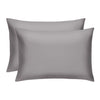The Daily Miracle
Why Do I Get So Cold at Night?
Published
August 14, 2022
Author
Miracle Brand

Do you spend most of your nights jolting awake out of a shivering slumber? Well, you're not alone. People all over the world have the same issue.
Being cold is one thing, but once it starts affecting your beauty rest, it becomes much more serious. Sleep is an essential factor in your overall health, so helping you find a solution to your nightly chills is our top priority.
Reasons You're Cold at Night
We wish there was one simple cause for your cold nights, but the truth is a multitude of things could cause your shivers. Some scientists believe it’s a facet of human evolution: dropping internal temps could help synchronize cells or to slow the metabolism to preserve energy.
Today, we’re going to talk about a few more reasons we have a little more control over — all in the name of a warm night's rest.
Anemia
Most of us are familiar with the condition called anemia. Interestingly, this may be the culprit behind your sleep issues.
Anemia is likely caused by an iron deficiency — when your body struggles to make enough red blood cells to carry oxygen through your bloodstream. Besides the constant feeling of being cold, anemia has other symptoms like fatigue, irregular heartbeats, and pale skin.
If you're anemic, chances are you're cold almost always, but especially at night once you're snug in bed and your heart rate has calmed.
The only way to really know if you're anemic is by getting your blood tested. Once your results are in, it will show if your iron levels are in the normal range or not. If they're not, your doctor will likely recommend taking an iron supplement.
Your doc might also recommend you make a few dietary changes as well. Eating more iron-rich foods like red meat, pork, beans, raisins, apricots, peas, and watermelon can help. Luckily, that sounds pretty delicious.
Underactive Thyroid
Thyroid issues can be a hassle to deal with; your body's need for extra layers at night may be a sign that you're suffering from an underactive thyroid (hypothyroidism).
Hyperthyroidism is when your thyroid can’t produce enough of the thyroid hormone, leaving your body feeling cold and worn out. However, the occasional chills are only one symptom. You may also notice an increase in weight, hair loss, and constipation.
Anorexia
Anorexia is an eating disorder that affects your body's ability to eat the necessary amount of food and nutrients it needs to function correctly.
Not eating enough can cause a drastic dip in your weight while affecting other things in your body, like your iron levels. Anorexia is a severe disease and should be brought up to your doctor as soon as possible.
Circulation Problems
If most of your discomfort stems from your extremities getting cold extra easily, you could possibly have a circulation problem. If your body isn't circulating blood properly, your hands and feet will be the first ones to notice.
You can implement a few simple tips and tricks into your daily routine to help combat your circulation problems.
- Exercise daily
- Stretch more often
- Wear compression socks and gloves
- Eat healthier
Circulation problems are usually not a huge deal, and a few simple habit changes may be able to help.
Menopause
Hormonal changes can drastically affect your body's temperature. When it comes to menopause, we're sure you've been warned about the hot flashes, but what about the cold ones? That's right: Menopause can be the reason you wake up shivering even if you're under your warmest covers.
Your Body's Natural Response to Sleep
Sometimes you're cold for reasons within your control, but other times it's merely your body's natural response to sleep.
It's completely natural for your body to get colder while you sleep because as you sleep, your body's core temperature drops due to a change in your circadian rhythm.
It's said that your body's temperature will actually dip as much as one to two degrees cooler once you fall asleep. It’s not only at night; some people’s internal temperature drops around mid-afternoon, causing those 2 PM urges for caffeine and a nap.
How To Stay Warm at Night
A few different things can cause your shiver fits, but what's really important here is that we learn how to make them stop! If you think your chills stem from a medical condition, you'll need to talk to your doctor for proper care.
But if you feel your cold nights are due to something simpler like weather changes or your circulation, we have a few possible solutions for you.
Adjust Your Surroundings
If you've made the necessary diet and exercise changes but still have no luck keeping warm at night, it's time to try a few of our tricks — adjusting your surroundings and nightly routine.
Take a Warm Bath Before Bed
Not only are we giving you permission to take some time to relax in a warm tub, but we're also saying to put it on your to-do list STAT.
Everyone appreciates unwinding in a warm bath after a long day, and if you struggle from cold flashes at night, this may be your sleep cycle's saving grace.
Fuzzy Socks Galore
Slipping on a warm pair of fuzzy socks is a feeling like no other, and if you spend most of your nights cold as can be, this wintertime ritual may need to become a part of your daily routine (yes, even in July).
It might feel unnatural putting on fuzzy socks mid-summer, but we say it's worth a try if there's a possibility of a good night's rest.
Revamp Your Bedding
While your body's temperature dropping might be its natural reaction to your resting, that doesn't mean that you don't deserve to feel extra warm and cozy anyways.
Fuzzy socks are a great way to stay warm, but an even better option is to revamp your bedding. Your bedding plays a crucial role in your comfortability and your body's temperature at night. You want to make sure you're using a comforter that's breathable but still offers you plenty of warmth — the same goes for your sheets and pillowcases.
Miracle Made makes bedding just for that purpose: Our bedding collection is temperature-regulating to ensure that no matter what type of sleeper you are (warm or cold), you'll always have bedding you can rely on. It’s made of Supima cotton infused with antimicrobial silver for unparalleled comfort and resistance to bacteria.
Turn Up the A/C
The only thing worse than waking up too cold is waking up too hot, which is why messing with the thermostat can be risky.
If you're someone that likes it cold when they first get into bed but warmer once you're asleep, we suggest putting your air conditioner on a timer. Keep it cool the first hour you lay down so you'll fall asleep fine. Then, have it slowly increase a degree or two an hour. This should prevent you from getting too cold too quickly.
Cozy Nights Ahead
Being awoken from a blissful dream to find yourself clutching your comforter for warmth isn't ideal. You can only pile on so many fuzzy blankets before they begin to bring too much heat into the equation.
The moral of the story is finding the perfect temperature can be tricky unless you have temperature-regulating bedding. We want to see you all get the sleep you deserve!
Sources:


















